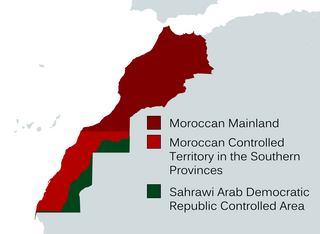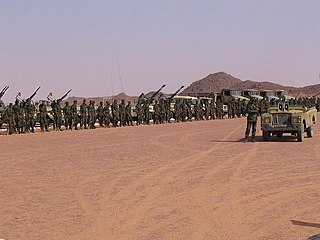The original inhabitants of Mauritania were the Bafour, presumably a Mande ethnic group, connected to the contemporary Arabized minor social group of Imraguen ("fishermen") on the Atlantic coast.
The history of Western Sahara can be traced back to the times of Carthaginian explorer Hanno the Navigator in the 5th century BC. Though few historical records are left from that period, Western Sahara's modern history has its roots linked to some nomadic groups such as the Sanhaja group, and the introduction of Islam and the Arabic language at the end of the 8th century AD.

The Polisario Front, Frente Polisario, Frelisario or simply Polisario, from the Spanish abbreviation of Frente Popular de Liberación de Saguía el Hamra y Río de Oro, is a rebel Sahrawi nationalist liberation movement claiming Western Sahara.

Moktar Ould Daddah was a Mauritanian politician who led the country after it gained its independence from France. Daddah served as the country's first Prime Minister from 1957 to 1961 and as its first President of Mauritania, a position he held from 1960 until he was deposed in a military coup d'etat in 1978.

The Green March was a strategic mass demonstration in November 1975, coordinated by the Moroccan government and military, to force Spain to hand over the disputed, autonomous semi-metropolitan province of Spanish Sahara to Morocco. At that time, the Spanish government was preparing to abandon the territory as part of the decolonization of Africa, just as it had previously granted independence to Equatorial Guinea in 1968. The Sahrawi people aspired to form an independent state. The demonstration of some 350,000 Moroccans advanced several kilometres into the Western Sahara territory. Morocco later gained control over most of the former Spanish Sahara, which it continues to hold.

The Madrid Accords, formally the Declaration of Principles on Western Sahara, was a treaty between Spain, Morocco, and Mauritania setting out six principles which would end the Spanish presence in the territory of Spanish Sahara and arrange a temporary administration in the area pending a referendum.

The Southern Provinces or Moroccan Sahara are the terms utilized by the Moroccan government to refer to the disputed territory of Western Sahara. These designations encompass the entirety of Western Sahara, which spans three of Morocco's 12 top-level administrative regions. The term "Southern Provinces" frequently appears in Moroccan state television.

The International Court of Justice Advisory Opinion on Western Sahara was a 1975 advisory, non-binding opinion by the International Court of Justice (ICJ) of two questions presented to it by the UN General Assembly under Resolution 3292 regarding the disputed territory of Western Sahara. Morocco had approached the UN to adjudicate its and Mauritania's claims over the territory.

Col. Mohamed Khouna Ould Haidallah was the head of state of Mauritania from 4 January 1980 to 12 December 1984. He was an unsuccessful candidate in the 2003 presidential election and the 2007 presidential election.

Tiris al-Gharbiyya was the name for the area of Western Sahara under Mauritanian control between 1975 and 1979.

To assist in the decolonization process of the Spanish Sahara, a colony in North Africa, the United Nations General Assembly in 1975 dispatched a visiting mission to the territory and the surrounding countries, in accordance with its resolution 3292.

The Western Sahara conflict is an ongoing conflict between the Sahrawi Arab Democratic Republic/Polisario Front and the Kingdom of Morocco. The conflict originated from an insurgency by the Polisario Front against Spanish colonial forces from 1973 to 1975 and the subsequent Western Sahara War against Morocco between 1975 and 1991. Today the conflict is dominated by unarmed civil campaigns of the Polisario Front and their self-proclaimed SADR state to gain fully recognized independence for Western Sahara.

The politics of the Sahrawi Arab Democratic Republic refers to politics of the Polisario Front's proclaimed Sahrawi Arab Democratic Republic, a country in North Africa with limited recognition by other states, controlling parts of the Western Sahara region.
Opération Lamantin was a December 1977 – July 1978 military intervention by France on the behalf of the Mauritanian government, in its war against Sahrawi guerrilla fighters of the Polisario Front, seeking independence for Western Sahara. Airstrikes were launched in the provinces with the aim of stopping separatist raids in the rail route from the iron mines in Zouérat to the coast of Nouadhibou, and pushing them to release French hostages. France used Jaguar combat aircraft from Dakar Airbase. The bombings targeted areas around the railway, which was constantly raided by Polisario. With the release of the hostages and the halt of Polisario's attacks on ore cargo, the mission was deemed successful.

Greater Mauritania is a term for the Mauritanian irredentist claim that generally includes the Western Sahara and other Sahrawi-populated areas of the western Sahara desert. The term was initially used by Mauritania's first president, Mokhtar Ould Daddah, as he began claiming the territory then known as Spanish Sahara even before Mauritanian independence in 1960.

The Western Sahara War was an armed struggle between the Sahrawi indigenous Polisario Front and Morocco from 1975 to 1991, being the most significant phase of the Western Sahara conflict. The conflict erupted after the withdrawal of Spain from the Spanish Sahara in accordance with the Madrid Accords, by which it transferred administrative control of the territory to Morocco and Mauritania, but not sovereignty. In late 1975, the Moroccan government organized the Green March of some 350,000 Moroccan citizens, escorted by around 20,000 troops, who entered Western Sahara, trying to establish a Moroccan presence. While at first met with just minor resistance by the Polisario Front, Morocco later engaged a long period of guerrilla warfare with the Sahrawi nationalists. During the late 1970s, the Polisario Front, desiring to establish an independent state in the territory, attempted to fight both Mauritania and Morocco. In 1979, Mauritania withdrew from the conflict after signing a peace treaty with the Polisario Front. The war continued in low intensity throughout the 1980s, though Morocco made several attempts to take the upper hand in 1989–1991. A cease-fire agreement was finally reached between the Polisario Front and Morocco in September 1991. Some sources put the final death toll between 10,000 and 20,000 people.

Mauritania, officially the Islamic Republic of Mauritania, is an Arab Maghreb country in West Africa. It is bordered by the Atlantic Ocean in the west, by Morocco in the north, by Algeria in the northeast, by Mali in the east and southeast, and by Senegal in the southwest. It is named after the ancient Berber Kingdom of Mauretania, which later became a province of the Roman Empire, even though the modern Mauritania covers a territory far to the south of the old Berber kingdom that had no relation with it.

Mauritania, officially the Islamic Republic of Mauritania, is an Arab Maghreb country in West Africa. It is bordered by the Atlantic Ocean in the west, by Western Sahara in the north, by Algeria in the northeast, by Mali in the east and southeast, and by Senegal in the southwest. It is named after the ancient Berber Kingdom of Mauretania, which later became a province of the Roman Empire, even though the modern Mauritania covers a territory far to the south of the old Berber kingdom that had no relation with it.
During the late colonial period, Mauritania had few contacts with the other territories of French West Africa. At the time of the independence referendum in 1958, Mauritania's representatives on the Grand Council of the AOF remained neutral, while all other AOF members divided between the African Democratic Rally and the African Regroupment Party. Until Mauritania became independent and Morocco threatened its security, Mauritania did not participate in AOF intraterritorial political, labor, or cultural movements. Only when Mauritania's existence as a state became problematic did it seek international recognition and support.

The Algeria–Western Sahara border is 41 kilometres (25 mi) in length and runs from the tripoint with Morocco in the north to the tripoint with Mauritania in the south.
















